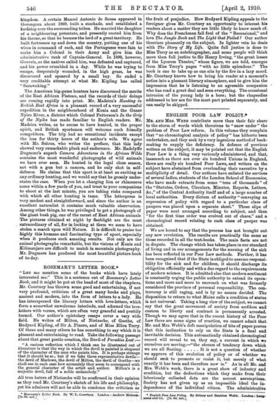ROSEMARY'S LETTER BOOK.* " LBT me mention some of the
books which have lately interested me." This is a sentence out of Rosemary's Letter Book, and it might be put at the head of moat of the chapters.
Mr. Courtney has thrown some good and entertaining, if not very profound, criticism of a great many books and plays, ancient and modern, into the form of letters to a lady. He has interspersed the literary letters with love-letters, which form a somewhat unwelcome interlude, and adorned the love- letters with verses, which are often very graceful and prettily turned. Our author's epistolary essays cover a very wide field. He writes of Milton, of Nietzsche, of Goethe, of Rudyard Kipling, of Sir A. Pinero, and of Miss Ellen Terry. Of these and many others he has something to say which it is pleasant and entertaining to read. Take the following passage about that great poetic creation, the Devil of Paradise Lost :—
" A curious reflection which I think can be illustrated out of literature is that the way in which the devil is painted is eloquent of the character of the man who paints him. It is perhaps strange that it should be SO; but if we take three representative devils— the devil of Marlowe, the devil of Milton, the devil of Goethe—we shall see in each case how accurately they seem to correspond with the general character of the artist and author. Milton's is a majestic devil, full of a noble melancholy."
All true haters of Nietzsche will be confirmed in their opinion as they read Mr. Courtney's sketch of his life and philosophy, yet his admirers will not be able to condemn the criticism as
• Rosemary's Letter Book. By W. L, Courtney. London:. Andrew.Xelrose.
[7s. ed. net.] • '
the fruit of prejudice. How Rudyard Kipling appeals to the foreigner gives Mr. Courtney an opportunity to interest his readers about a matter they are little likely to know much of. Why does the Frenchman fall foul of the "Recessional," and love The Jungle Book and The Light that Failed ? Our author theorises pleasantly on the subject. In lighter vein he deals with The Story of My Life. Quite full justice is done to Miss Terry as an autobiographer, and some people will think more than full justice to Sir Henry Irving, "the great lessee of the Lyceum Theatre," whose figure, we are told, emerges from Miss Terry's pages "with no little splendour." The book is one to take up as one site by the fire in a lazy mood. Mr. Courtney knows how to bring his reader at a moment's notice into a pleasant literary atmosphere, and to give him the impression that he is listening to an agreeable companion who has read a great deal and seen everything. The occasional intrusion of the young lady is a bore; but the rhapsodies addressed to her are for the most part printed separately, and can easily be skipped.










































 Previous page
Previous page